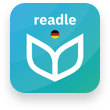
Today, we would like to present you with a short pronunciation guide.
Sound is very important in the German language. If you mispronounce words, people might not understand you – or, even worse, you could insult someone unintentionally.
Don’t worry, though – German pronunciation is not exceptionally difficult. However, there are some simple basic things that you should learn – such as the German alphabet.
A tip: Be sure that you are pronouncing the words that you are learning correctly – for example, by checking them in online dictionaries – and follow the pronunciation rules.
Luckily, there aren’t many exceptions in German pronunciation – so once learned, it will be easy to integrate into your language learning process.
How To Pronounce German Words?
Let us try to explain some basic pronunciation rules by comparing them with the English ones. For better comprehension, we have used basic German words as examples – which might be pretty convenient for you as a beginner.
By the way, please note that as a rule, English or French words in German keep their original pronunciation, e.g., “restaurant “– [rɛstoˈrɑ̃ː].
Some Examples
- “e” = sounds similar to English “e” in “help” (Example: helfen = to help).
- “i” = sounds like “i” in “to live” (ich bin = I am).
- “h” at the beginning of the word = h (Haus = house).
- vowel + “h” = long vowel (ehen <- sounds like ‘geen’ = to go).
- “s” at the word beginning (singen = to sing) and “s” between 2 vowels (Hase = rabbit, Musik = music) = “z” like in English “zigzag.”
- “ss”, “ß” = s (essen = to eat; heiß = hot, Fuß = foot).
- “sch” = “sh” (Schule = school).
- “tsch” = you get this if you say “t” and “sh” almost at the same time, just try to spell them one after another (i.e., “t” before “sh”) as quickly as you can (Deutsch = German).
- vowel + duplicate consonant = short vowel (Bett = bed; Sonne = sun).
- ch = h (machen = to make).
- ck = k (backen = to bake).
- “z,” “tz” = try to say “t + s” at the same time, and you should get that sound (tanzen = to dance).
What’s That Sound Like?

Of course, as you learn how to pronounce German words, it might come tough if you don’t practice enough. That is why we recommend you to speak German more, which will help you to intuitively pronounce the sounds correctly in the future.
Let’s Practice Some German Sounds
- r at the beginning of the word makes a gurgling sound. When the letter r appears at the beginning of a word, it creates a rolling sound way in the back of your throat. Give it a try. Make an r sound, then pretend you are gurgling while you do it.
- r (at the end of the word) sounds like “uh.”
Native
Translation
Die Jacke ist teuer.
This jacket is expensive.
- ch sounds like an angry cat (sh). Try it out by making a very short, cat-hissing sound.
- The ß is just an “ss” sound. Or is it a snake about to attack? Don’t let that weird “ß” symbol confuse you. It’s called an eszet. It’s just an “s” sound, “sss.”
- In fact, it’s been an ongoing debate whether to eliminate the eszet and replace it with a double-s (ss) as part of a spelling reform movement.
- The j in German is pronounced like an English “y.” You say die Jacke (the jacket), like you would say yes.
- The w sounds like the English v – or as if a car is refusing to start? You’re definitely going to need to master this sound because almost all German question words begin with w’s (Was?, Wann?, Wo?)
- The v sounds like the English f. Can you hear the wind blowing? This one may sound like the wind, but that was the sound the letter v makes in German. It’s the same sound as our English f (der Vater – father).
Next Stop: German Umlauts

Ready for some vocal gymnastics? Germans have a few vowels that don’t exist in English.
ä, ö, and ü
The double dots above vowels are called Umlauts. They change the sound of the vowel to something that sounds like you’re getting dental work done while trying to speak. Surprise your dentist on your next visit and practice your German with some Umlauts.
Here’s what they sound like:
ä – sounds like the short-e sound in English, like in “end.”
Native
Translation
der Käse
the cheese
das Mädchen
the girl
ö – Try to start with a short -e, and now round your lips like you’re going to suck on a straw. That sound at the end is what you’re going for!
ü – Start with a long -e sound (like “keep”) and without moving your tongue, round your lips like you’re about to suck on a straw. That sound at the end is what you’re going for.
Native
Translation
die Tür
the door
über
above, over
When you start to learn German, please always remember that ALL German nouns should be written with a capital letter. Every word that has der, die, das in front of it is a noun and needs to be written with a capital letter. e.g. der Sport (sports), die Schule (school), das Mädchen (girl), das Haus (house) etc.
Alles Klar? – Got It?
I hope you have a better understanding now of the basic rules of German pronunciation. If you still feel uncomfortable about it and would like to be sure that you are pronouncing the German words correctly, please check out some free online dictionaries with German pronunciation – or download our app and see how native speakers pronounce those words.
Want to Learn More?
Check out these free websites as well:
Pons
This site is great because it will help you to translate any word into many different languages. It also offers an online vocabulary trainer – so you can learn how to pronounce German words properly.
Dict.cc
This website offers a huge number of languages. Along with the usual combinations (like German – Englisch, German – Spanish, etc.), you can find the following “exotic” ones: German – Latin, German – Esperanto, German – Serbian, etc. That’s just great for learning!
YouTube
As this is one of the biggest platforms, you will find numerous videos to practice your German pronunciation there. Just type in “German pronunciation’” and select a video of your choice. Here’s one you might like.
Do You Want To Master Your German Pronunciation?
Now you got the tools you need to master your German pronunciation – great! But perfection comes with practice.
To complete your German vocal workout, consider downloading the Readle – Learn German App. Readle offers textbooks, lessons, dictionaries, grammar, and more – so you can have fun while learning German at the same time.
